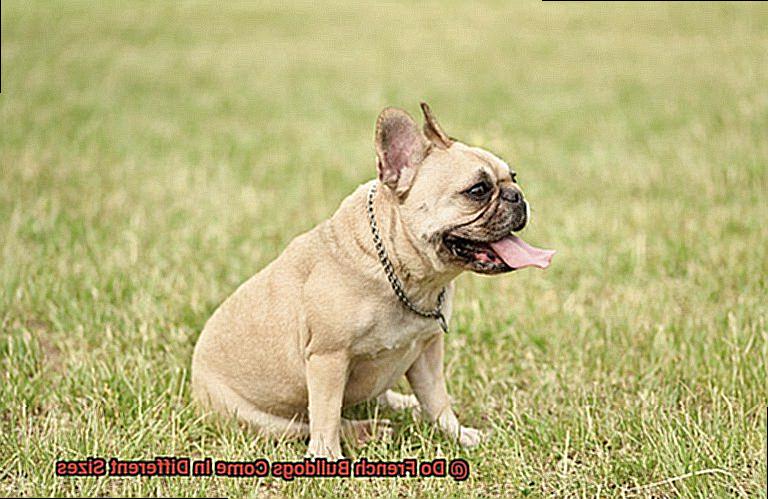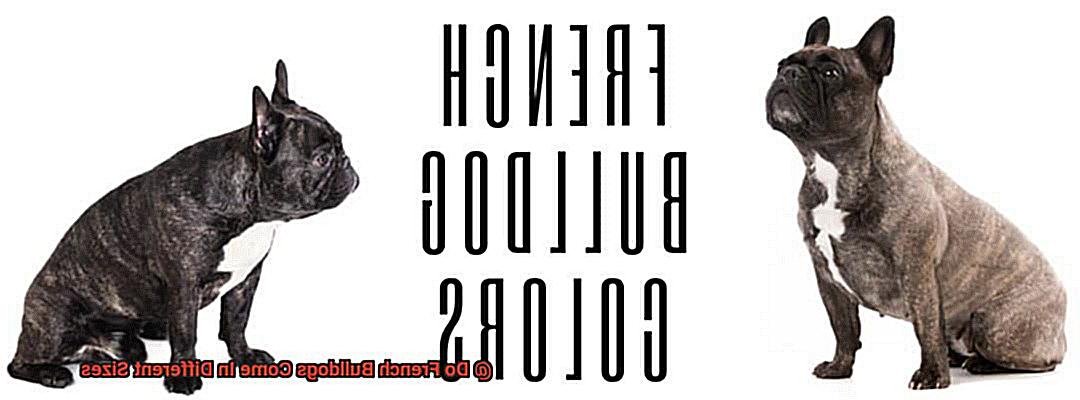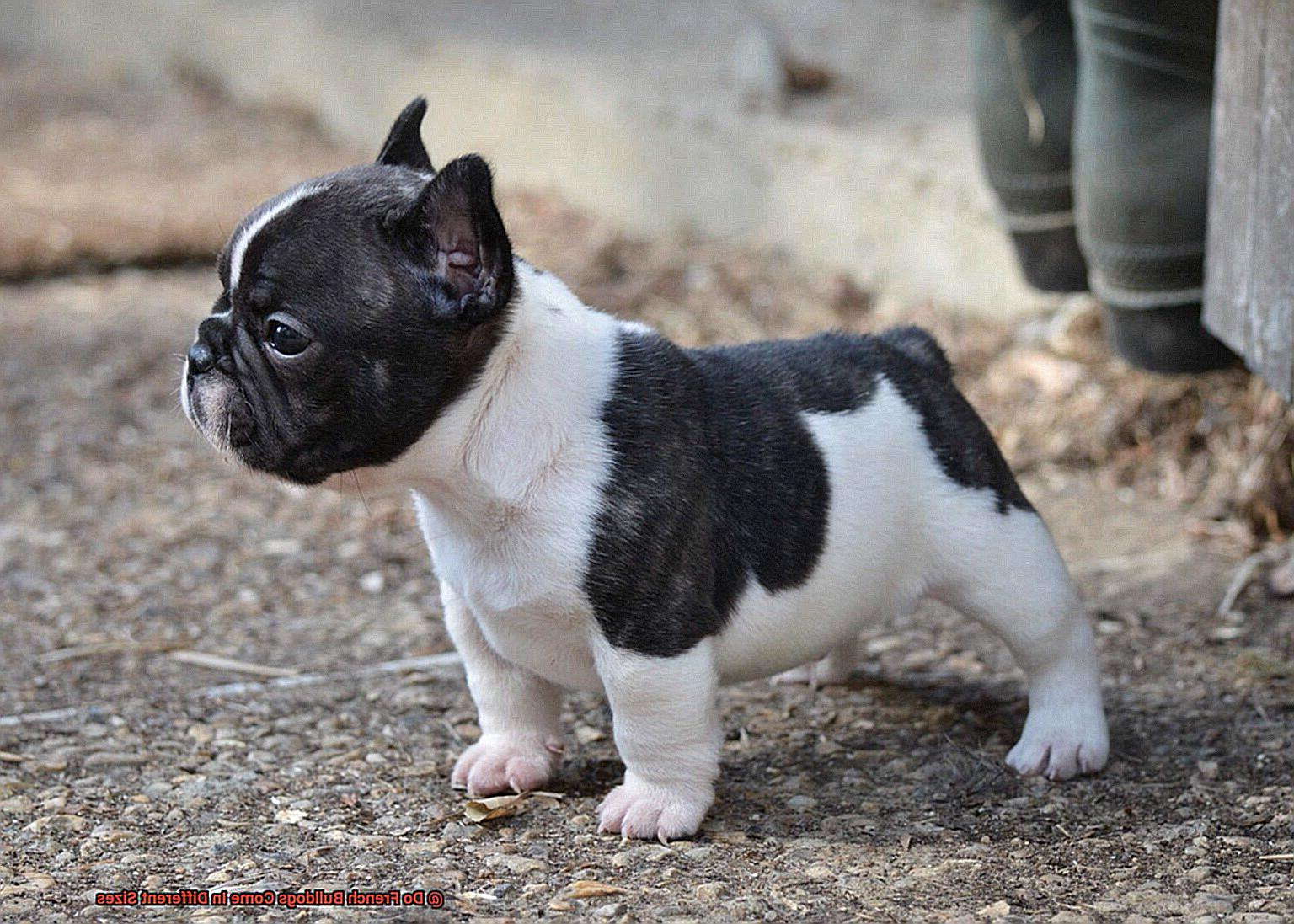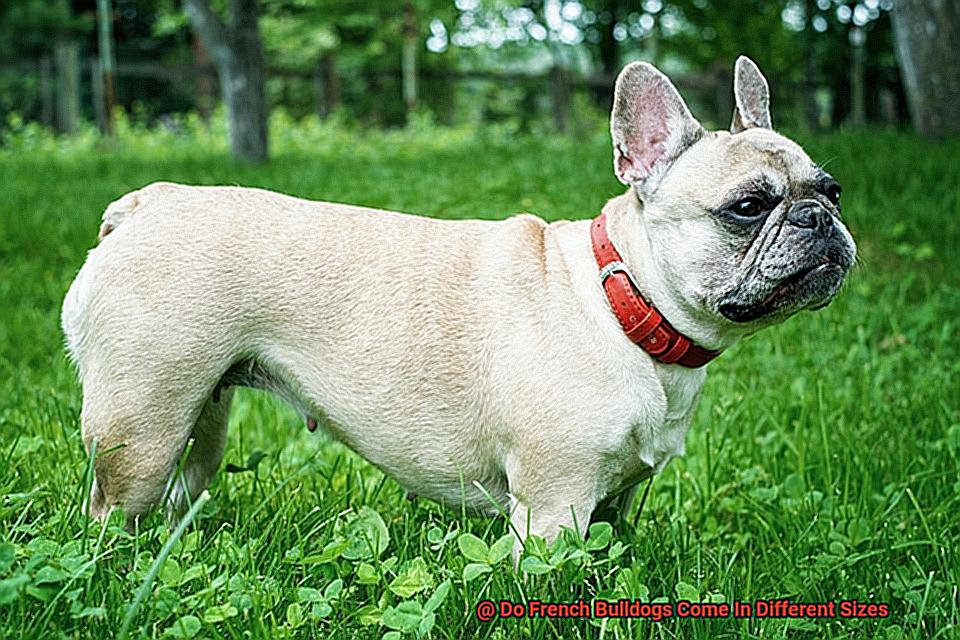Do French Bulldogs Come In Different Sizes?
Welcome to our blog post all about the fascinating world of French Bulldogs.
Love these adorable pups? Ever wondered if they come in different sizes?
Well, you’re in luck. We’re here to spill the beans on this intriguing topic.
French Bulldogs have stolen the hearts of dog lovers worldwide with their unique looks and lovable personalities. And guess what?
So, whether you’re thinking of bringing one home or just curious about these delightful companions, buckle up and get ready for a deep dive into the world of different-sized French Bulldogs.
Do French Bulldogs come in different sizes
Contents
- 1 Do French Bulldogs come in different sizes
- 2 The Standard Size of a French Bulldog
- 3 Variations in Size Among French Bulldogs
- 4 Breeding for Health and Temperament Over Size
- 5 Smaller French Bulldogs: Mini and Teacup Varieties
- 6 Larger French Bulldogs: XL and King Varieties
- 7 Working with Reputable Breeders for Specific Sizes
- 8 Prioritizing Overall Health and Well-Being Over Size
- 9 Conclusion
Well, the answer is yes. French Bulldogs do have variations in size, but it’s essential to separate facts from fiction. In this article, we’ll delve into the different sizes that French Bulldogs can come in and debunk some common misconceptions. So, let’s dive right into it.
The Ideal Size:
According to the breed standard, French Bulldogs should ideally weigh between 16-28 pounds (7-13 kg) and stand around 11-12 inches (28-30 cm) tall at the shoulder. This weight range gives them their characteristic sturdy and compact build.
Variations in Size:
While most French Bulldogs fall within the standard size range, there can be slight variations. Some may be slightly smaller or larger without any health issues. Factors like genetics, breeding lines, and individual health can influence a French Bulldog’s size.
Smaller Sizes: Mini or Teacup?
You may have heard terms like “mini” or “teacup” French Bulldogs when referring to smaller-sized ones. However, it’s important to note that these terms are not recognized by official breed standards. Unscrupulous breeders often use them to market undersized or unhealthy dogs. Responsible breeders prioritize the breed standard and focus on producing healthy puppies within the ideal size range.
Larger Sizes: Oversized Frenchies?
On the other end of the spectrum, some French Bulldogs may exceed the standard weight range. These dogs are sometimes referred to as “oversized.” While they can still be healthy and well-proportioned, it’s crucial to be aware of potential health issues associated with increased size, such as joint problems or breathing difficulties.
Prioritizing Health and Temperament:
When selecting or breeding a French Bulldog, size should never be the sole determining factor. Health, temperament, and adherence to breed standards should always take precedence. Responsible breeders focus on producing dogs that are healthy, well-tempered, and true to the breed’s characteristics.

The Standard Size of a French Bulldog
Fear not, for I am here to shed light on this topic and provide you with expert knowledge to help you understand the dimensions of your furry companion.
Understanding the Breed Standards:
French Bulldogs have a set standard size that is recognized by breed standards. These standards ensure that French Bulldogs maintain a consistent appearance and size throughout the breed. So, when it comes to determining the size of your Frenchie, we turn to these guidelines.

Height at the Shoulder:
The standard height for a French Bulldog ranges between 11 to 12 inches (28 to 30 cm) at the shoulder. This measurement is taken from the ground to the highest point of their shoulder blades. So, next time you measure your Frenchie, grab your trusty tape measure and get down to business.
Weight Range:
When it comes to weight, standard-sized French Bulldogs typically fall within the range of 16 to 28 pounds (7 to 13 kg). Remember, though, that individual dogs may have varying bone structures and body compositions, so slight deviations within this range are normal.
Genetics and Breeding:
The size of a French Bulldog is primarily determined by genetics and breeding practices. Responsible breeders carefully select parents with desirable traits, including size, to produce puppies that adhere to the breed standard. This ensures that your Frenchie maintains their unique charm and proportions.
Factors Influencing Size:

While genetics play a significant role in determining size, other factors such as nutrition and exercise can also influence your Frenchie’s dimensions. Providing a balanced diet and regular exercise will help your furry friend maintain a healthy weight and physique.
Lifestyle Considerations:

When choosing a French Bulldog, it’s essential to consider their size in relation to your lifestyle and living situation. Smaller French Bulldogs may be more suitable for apartments or homes with limited space, while larger ones may require more room to roam and stretch their adorable little legs.
Remember the Bigger Picture:
While size is an important consideration, it’s crucial to remember that it alone does not determine the overall health or quality of a French Bulldog. Factors such as temperament, conformation, and genetic health should also be taken into account when selecting a puppy.
Variations in Size Among French Bulldogs

Today, we will delve into the captivating world of French Bulldog sizes. As an expert in this field, I will shed light on the factors that can cause variations in size among these adorable pups. So, grab a croissant, sit back, and let’s embark on this journey together.
Breed Standards:
Just like fashion trends in Paris, French Bulldogs have their own standards when it comes to size. According to the breed standard, a mature French Bulldog should ideally weigh between 16-28 pounds (7-13 kg) and stand around 11-12 inches (28-30 cm) tall at the shoulder. However, don’t fret if your Frenchie doesn’t fit perfectly within this range – slight variations are perfectly normal.
Genetics:
Genetics – the blueprint of life. Just like humans, French Bulldogs inherit certain traits from their parents, including their size. If both parents are petite, it’s likely that their offspring will be on the smaller side too. Conversely, if both parents are larger, expect bigger bundles of love in your Frenchie family.
Gender Matters:
When it comes to size, gender does play a role. Generally, male French Bulldogs tend to be slightly larger than their female counterparts. However, remember that individual dogs may defy these norms and surprise us with their unique sizes.
The Age Factor:
The beauty of growth and development. French Bulldogs go through various stages as they blossom into adulthood. While they are considered fully grown by one year of age, some may continue to fill out until they reach around two years old. During this time, expect changes in size and body structure – just like teenagers going through growth spurts.

Health Over Size:
While we all swoon over those tiny teacup Frenchies or marvel at the grandeur of giants, it’s vital to prioritize the health and well-being of our four-legged companions. Breeding for extremely small or large French Bulldogs can lead to various health issues, so let’s focus on nurturing healthy, happy pups instead.
Breeding for Health and Temperament Over Size
When it comes to selecting a French Bulldog puppy, many potential owners are drawn to the idea of having a dog that is larger than average. After all, who wouldn’t want a big, muscular Frenchie that turns heads everywhere you go? But as tempting as it may be to prioritize size, it is crucial to understand why health and temperament should always be the top priority.
Breeding for size alone can have detrimental effects on the health of French Bulldogs. These adorable little dogs already have a brachycephalic (short-nosed) structure that predisposes them to respiratory issues. Breeding for larger size can exacerbate these problems, leading to difficulties breathing, overheating, and an increased risk of heat stroke. Additionally, breeding for size can also result in joint problems such as hip dysplasia, which can cause pain and mobility issues for the dog.
Responsible breeders understand the importance of prioritizing health over size. They carefully select parent dogs with good overall health and conduct thorough health screenings to ensure that they are free from hereditary diseases or genetic conditions that can be passed on to their offspring. By prioritizing health, breeders can help ensure that the puppies will grow up to be healthy and strong.
Temperament is another critical aspect of breeding French Bulldogs. These dogs are known for their friendly and sociable personalities, making them excellent companions for individuals and families alike. Breeding for temperament involves selecting parent dogs with desirable temperaments and providing proper socialization and training to the puppies from an early age. This helps ensure that they grow up to be well-adjusted dogs that are a joy to be around.
While French Bulldogs may vary slightly in size within the breed standard, it is essential to remember that size should not be the determining factor when choosing a puppy. A healthy and well-tempered dog should always be the primary goal. Size is not a reliable indicator of overall health or temperament.
It is also important to be aware of unethical breeders who may intentionally breed French Bulldogs for extreme sizes, such as extremely large or extremely small individuals. These practices can have severe consequences for the health and well-being of the dogs and should be avoided at all costs. Responsible breeders adhere to the breed standard and prioritize the well-being of the dogs they breed.
Smaller French Bulldogs: Mini and Teacup Varieties
Are you a French Bulldog lover but looking for a smaller version of this adorable breed? If so, then you may be interested in learning more about mini and teacup French Bulldogs. These smaller varieties have gained popularity among dog enthusiasts who prefer a compact and portable canine companion. In this expert overview, we will delve into the differences between mini and teacup French Bulldogs, discuss their health concerns, and provide insights on their special care requirements.
Mini French Bulldogs: Petite and Playful
Mini French Bulldogs are a smaller variation of the standard breed. They typically weigh between 16 to 25 pounds, making them perfectly suited for those living in apartments or with limited space.
Despite their smaller size, mini French Bulldogs retain the same friendly and affectionate temperament as their larger counterparts. Their playful nature makes them excellent companions for families and individuals alike.
Teacup French Bulldogs: Tiny but Tenacious
Teacup French Bulldogs take the smallness factor to another level. Weighing as little as 10 pounds, these pint-sized pooches are incredibly adorable. However, it is important to note that breeding for such extreme sizes can lead to health issues. Teacup French Bulldogs may be prone to respiratory problems, joint issues, and other health complications due to their small stature. Potential owners must carefully consider these risks before deciding to bring home a teacup French Bulldog.
Health Concerns: Breathing and Joint Problems
One of the main health concerns for mini and teacup French Bulldogs is their predisposition to breathing problems. Their short snouts, known as brachycephalic features, can lead to difficulties in regulating body temperature and oxygen intake. These dogs may experience snoring, wheezing, and even heatstroke in extreme weather conditions. Additionally, their small size can put extra strain on their joints, increasing the risk of arthritis and other musculoskeletal issues. Regular vet check-ups and proper care are essential to ensure the well-being of mini and teacup French Bulldogs.
Special Care Requirements: Balanced Diet and Exercise
Mini and teacup French Bulldogs may require special care to maintain their health. A balanced diet is crucial to prevent obesity, which can exacerbate breathing and joint problems. Feeding them high-quality, appropriate portions of food will help keep them in optimal condition.
Regular exercise is also important for weight management and overall well-being. However, it’s vital to avoid excessive exercise that could strain their joints. Short, low-impact activities like walks or playtime in a controlled environment are ideal for mini and teacup French Bulldogs.
Larger French Bulldogs: XL and King Varieties
Are you a fan of French Bulldogs but wish they came in a bigger size? Well, you’re in luck. In this article, we’ll explore the world of XL and King French Bulldogs, the larger variations of this adorable breed. But before we dive in, let’s take a moment to understand the potential health implications that come with these bigger pups.
Joint Problems:
One of the main concerns with XL and King French Bulldogs is their increased risk of joint problems. The extra weight and size can put additional strain on their joints, leading to issues like hip dysplasia or arthritis. It’s crucial to monitor their activity levels and provide them with a balanced diet to maintain a healthy weight.
Respiratory Difficulties:
French Bulldogs are already prone to respiratory issues due to their brachycephalic (short-nosed) structure. With XL and King varieties, these problems can be exacerbated. Their larger size may put even more pressure on their airways, making it harder for them to breathe properly. Regular vet check-ups and avoiding strenuous exercise in hot weather can help manage these concerns.
Obesity Risk:
With their big appetites and slower metabolism, XL and King French Bulldogs have an increased risk of obesity. Extra weight can put strain on their joints, exacerbate respiratory issues, and lead to other health problems like diabetes or heart disease. A balanced diet and regular exercise are crucial to keeping them fit and healthy.
It’s important to note that not all XL or King French Bulldogs will experience these health issues, but the risks are higher compared to standard-sized French Bulldogs. Responsible breeding practices that prioritize the overall well-being of the dogs can minimize these potential health concerns.
Remember, XL and King French Bulldogs are not recognized as separate breeds by major kennel clubs. While they may appeal to some individuals seeking a larger companion, it’s essential to prioritize their health and well-being. Work with reputable breeders who prioritize the long-term welfare of their dogs.
Working with Reputable Breeders for Specific Sizes
French Bulldogs are known for their distinct appearance and charming personalities. Whether you’re looking for a compact and portable companion or a larger, more majestic Frenchie, finding a reputable breeder is essential to ensure that you get a French Bulldog of the specific size you desire. As an expert in the field, I have witnessed firsthand the importance of working with reputable breeders when it comes to finding French Bulldogs of specific sizes.
Adherence to Breed Standards:
Reputable breeders understand and adhere to the breed standards set by kennel clubs and breed associations. These standards include guidelines on size, weight, and overall appearance of French Bulldogs. By selecting and breeding dogs that conform to these standards, reputable breeders maintain the desired size of the breed.
Expertise in Genetics:
Size is influenced by genetics, and reputable breeders have a deep understanding of this aspect. They carefully plan their breeding programs, analyzing the size history of parent dogs and studying their lineage to predict the potential size of offspring. This expertise allows them to produce puppies with predictable sizes.
Health Testing:
Health issues can impact the growth and development of French Bulldogs, potentially affecting their size. Reputable breeders invest in health testing for their breeding dogs, including evaluations for hips, elbows, eyes, and genetic screenings. By identifying any potential health concerns that might impact size, reputable breeders can ensure that the puppies they produce grow up to be within the standard size range.
Preserving Breed Integrity:
Reputable breeders are committed to preserving the integrity of the French Bulldog breed. They prioritize responsible breeding practices, which includes carefully selecting parent dogs based on their size and adhering to breed standards. This dedication ensures that you receive a French Bulldog that not only meets your size expectations but also possesses the qualities that make the breed so special.
Ongoing Support:
Working with reputable breeders doesn’t end once you bring your new Frenchie home. They provide ongoing support and guidance, answering questions about your puppy’s growth and development. From advice on nutrition to tips for exercise and general care, reputable breeders offer the resources you need to help your French Bulldog thrive within the expected size range.
Prioritizing Overall Health and Well-Being Over Size
French Bulldogs are popular pets known for their unique appearance and compact size. However, it is essential to prioritize their overall health and well-being over their size. In this article, we will explore why focusing on the health of your French Bulldog is more important than their size, providing expert insights and practical tips for responsible ownership.
Size Variations in French Bulldogs:
- While there is a standard size range for French Bulldogs, it’s important to understand that variations in size are natural and not indicative of health issues.
- The breed standard suggests an ideal weight of 16-28 pounds and a height of around 11-12 inches at the shoulder. However, French Bulldogs can fall outside of this range without being unhealthy.
Health Risks Associated with Extreme Sizes:
- Breeding for extreme sizes can lead to structural issues, such as joint problems and difficulty breathing.
- By prioritizing overall health over size, responsible breeders aim to produce well-balanced puppies with sound structure and good overall health.
Choosing a Reputable Breeder:
- When looking for a French Bulldog, choose a reputable breeder who prioritizes health testing and responsible breeding practices.
- Reputable breeders ensure you get a dog that is not only the right size but also healthy and free from genetic diseases.
Maintaining Overall Health Regardless of Size:
- Proper care and nutrition play a vital role in the overall health and well-being of your French Bulldog.
- Regular exercise, a balanced diet, and routine veterinary check-ups are crucial for their overall well-being.
Considerations Beyond Size:
Te27_3KnCeg” >
Conclusion
In conclusion, French Bulldogs do come in different sizes.
While the breed standard specifies a weight range of 16-28 pounds, there can be variations within this range. Some French Bulldogs may be on the smaller side, weighing around 16-20 pounds, while others may fall on the larger end, weighing closer to 25-28 pounds.
It’s important to note that regardless of their size, French Bulldogs are known for their adorable appearance and lovable personalities.




